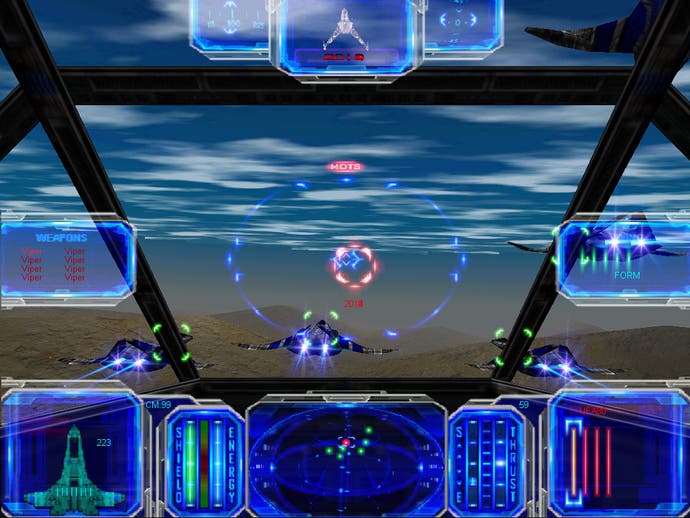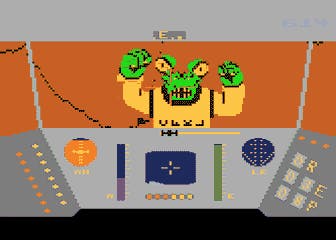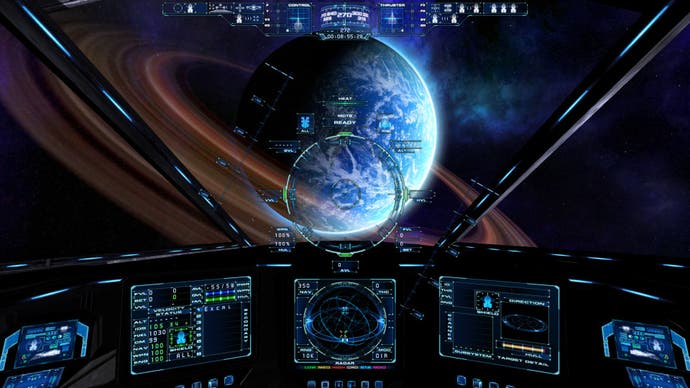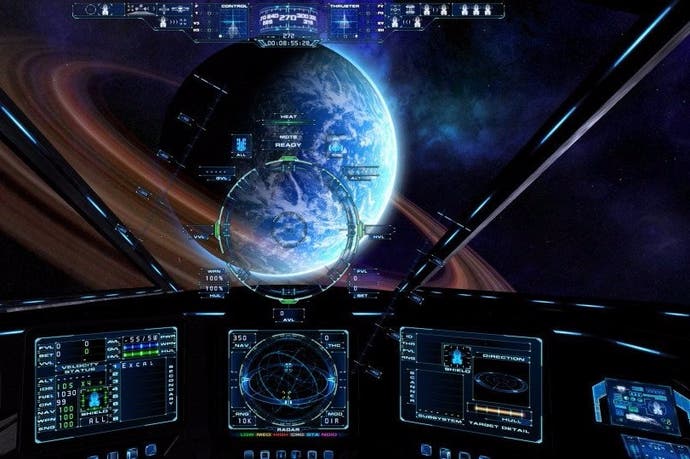30 years in space: Meet the man who's kept space sims flying
The stars his destination.
It's hard to say what the most overused plot in gaming might be, but when it comes to a certain genre it's fair to say that the launching of a fleet of hastily built space arks in an effort to evade extinction is about as derivative as it gets. It's somewhat fitting that the collective history of said games has followed precisely the same trajectory.
It was against a dark background of first-person shooter dominance that the once mighty space sim teetered on the brink of irrelevance. Having birthed the now ubiquitous open-world sandbox by way of Elite, and later, thanks to Wing Commander, establishing the PC as a mainstream gaming machine, the genre's leading architects had seemingly abandoned ship. With only a couple of anomalous mouse-controlled space brawlers to distract them, players at the dawn of the millennium were increasingly in thrall to world wars and pantomime jihadists, leaving the space game genre to float unceremoniously towards oblivion.
With none of its trailblazing commanders to lead it through the interminable darkness, the fate of the space genre was left in the hands of a few under-resourced developers. Being the only one to achieve mainstream success, X series creator Egosoft led the way. Behind it jostled a rag-tag fleet of Russian-made hulks and semi-complete mods powered by ageing 3D engines. Meanwhile, gliding almost unnoticed beneath the toxic roar of the Battlecruiser series' indomitable Smart-drive™, a succession of solid if unspectacular titles flying under the banner of Star Wraith 3D Games completed the procession - and would, in time, constitute the bulk of it.

As the founder and sole developer of Star Wraith 3D Games, Shawn Bower has been quietly turning out space combat titles for almost as long as the genre has existed. Considering that his first effort, Star Commander, was being prototyped before even Wing Commander was released - and the fact that he's barely stopped iterating since - he's more than your typical unsung hero. For those that venerate the likes of David Braben and Chris Roberts as pioneering as gods of the genre, Bower would make a worthy Noah.
"I wouldn't go that far!" he laughs. "Honestly, it's a little humbling to even be mentioned in the same sentence as either of those two. I've just consistently kept working to make space games I enjoy. I can't really say that I've saved anything, but rather just provided such games during times when it didn't seem very practical or popular to do so."
Space games were very much the rage when as a teenager Bower sat down to type in his first line of code, yet despite being blown away by Star Raiders on the Atari VCS and The Last Starfighter on the big screen, it was Bower's affinity for and enjoyment of the popular flight sims of the day, such as the early Chuck Yeager and Falcon games, that were the most inspirational. "Being the son of a real world pilot, I really wanted to bring the idea of jet fighter style combat into the realm of space" he says, "including a realistic approach to avionics."
Rather than genre stalwarts Elite or Starglider, Bower cites LucasFilm Games' Rescue on Fractalus and Access Software's relatively unknown 1987 space shooter Echelon as landmark titles. With it's complex dials and readouts, planetary exploration and innovative voice controls, Echelon's obvious flight sim aesthetic masked a breadth of hidden content, while Fractalus' focus on retrieving downed pilots from a hostile planetary environment hinted at new possibilities in a genre mostly obsessed with destroying alien invaders. Both games, and more besides, provided the catalyst for Bower's ambition, one that has taken decades to become realised.

Despite his early shareware releases during the 1990s attracting modest publisher interested, it wasn't until the the ubiquity of Internet access and the ability to self publish that Bower's games started to find an audience. Released in 2000, Star Wraith was significant, for though a rudimentary mission-driven space shooter in most respects, it provided the first solid foundation on which to build ideas and iterate code. Bower worked quickly too, releasing three Star Wraith sequels and two open-world spin-off games over the course of the next five years. From a distance it may have been difficult for casual observers to tell one Star Wraith game from another, but for those that devoured them, the progression of ideas was striking. Despite being limited by resources, each game's feature list only seemed to get ever longer while the old fixtures and fittings became more evolved.
While Star Wraith 3 was in many ways the breakthrough game, proving to be popular on the back of space-to-planetary-surface transitions not seen since the Elite sequels, it was the was the open-world Evochron games - the first of which arrived in 2005 - that have afforded Bower the greatest creative freedom. Its modest success enabled Bower to make the transition to full-time development and, more recently, to bring in hired help when needed. With the recently released Evochron Legacy, there's a real gloss to much of the series' features, not so much of a sparkle that it threatens to dim the console-courting shine of Elite Dangerous, but enough to bring out elements of play that distinguish the game from it's more deeply-financed contemporaries.
"My efforts were pushing me forward as I set out to achieve personal objectives for my projects, rather than attempting to push an entire genre ahead as a whole" says Bower. "One of my primary goals was to explore what I could do with what I had to work with and provide some unique elements within the main context of the style of space game I wanted to make. In some ways I kept foundations I'd established earlier, while in others I'd push into new concepts. But I've always wanted to stay focused on the pilot and flying aspects in my space games as that's really what interests me most."

After years of wandering the inky black beyond, space games are flourishing once again. It was inevitable that they would, even before Commanders Braben and Roberts roused themselves from stasis. Shawn Bower felt it. Eve Online's decade-long growth echoed it, and the re-introduction of genre classics to digital stores affirmed it; somewhere out there an eager audience was watching the skies, waiting, for a new breed of space sims heroes to appear. In TV and film, popular re-imaginings and reboots of Battlestar Galactica, Star Trek and Star Wars only served to underline an appetite for battles played beyond the stars, an appetite that has since been duly sated, more by way of fan-sourced funding than publisher foresight, by countless games that overlap across every genre and theme, moving ever outwards across gaming's ever-expanding universe.
And yet, in spite of an abundance not seen since the genre's golden age, there is at the heart of the resurgence a small but noticeable void, not one that threatens to engulf or implode, but that just simply exists in the wake of everyone else's eagerness to boldly go where other developers have probably gone, just not in quite the same way. It's a void that Bower is happy to continue trying to fill by himself, at least for the time being.
"Evochron Legacy is kind of a culmination of what I've ultimately wanted to do in a space sim," he says. "There may be a few things left I want to try out and explore, but this game may be my last solo effort on such a large scale. I feel I'm reaching the point where I'm barely able to manage a project of this size on my own. I may either need to join up with a team for something similar in the future or consider a different, simpler direction for my next project."
Here's hoping we see more of Bower, because despite the resurgence of the space simulation genre we're still left wanting for some real simulation - where rookie pilots are bewildered by spinning dials, blinking lights and obscure acronyms, and where progression requires a small measure of determination in order to master the controls of a sleek and dangerous F16-styled space machine. While No Man's Sky and Star Citizen take the headlines, it would be a shame if Evochron Legacy ended up being the last of the old school starfighters.








